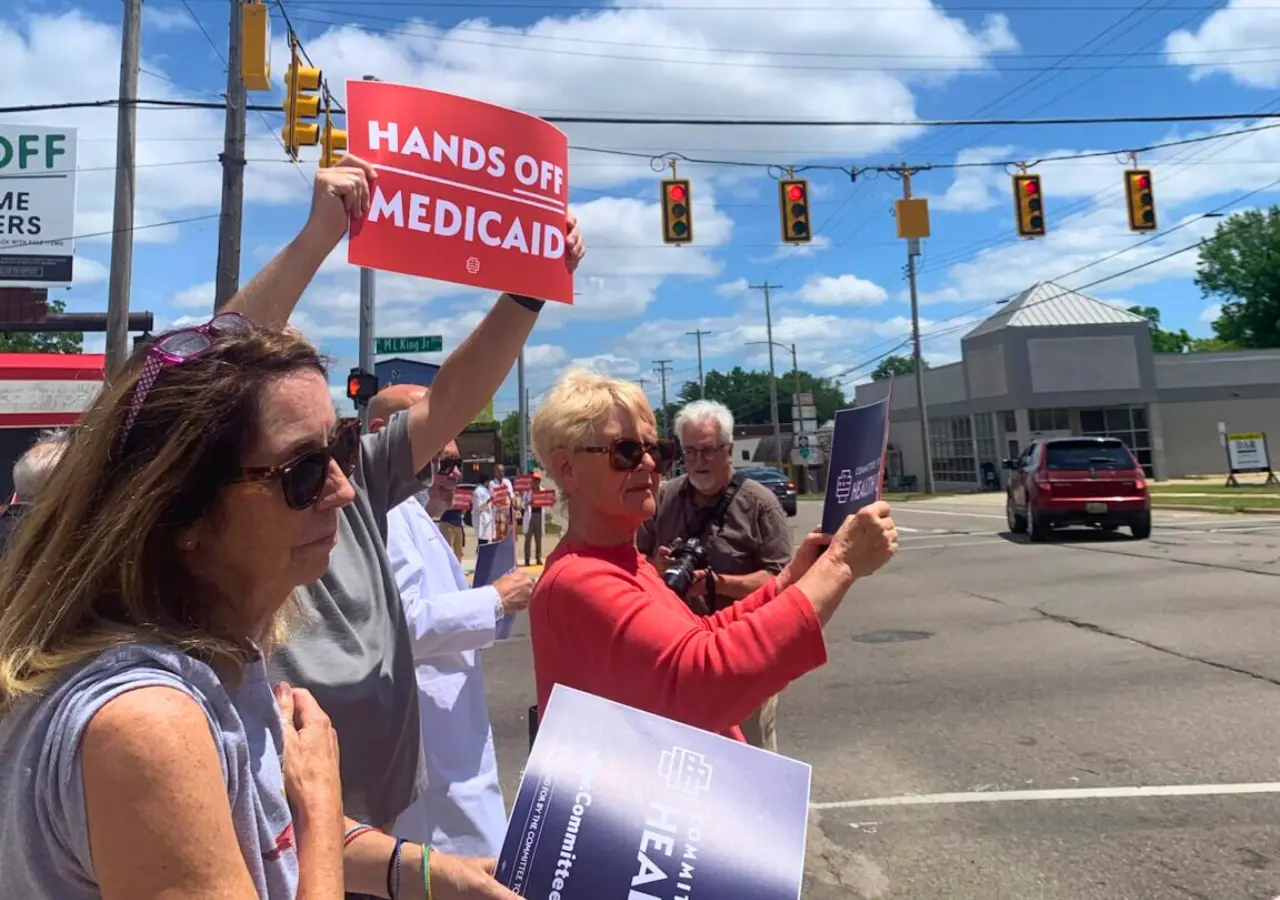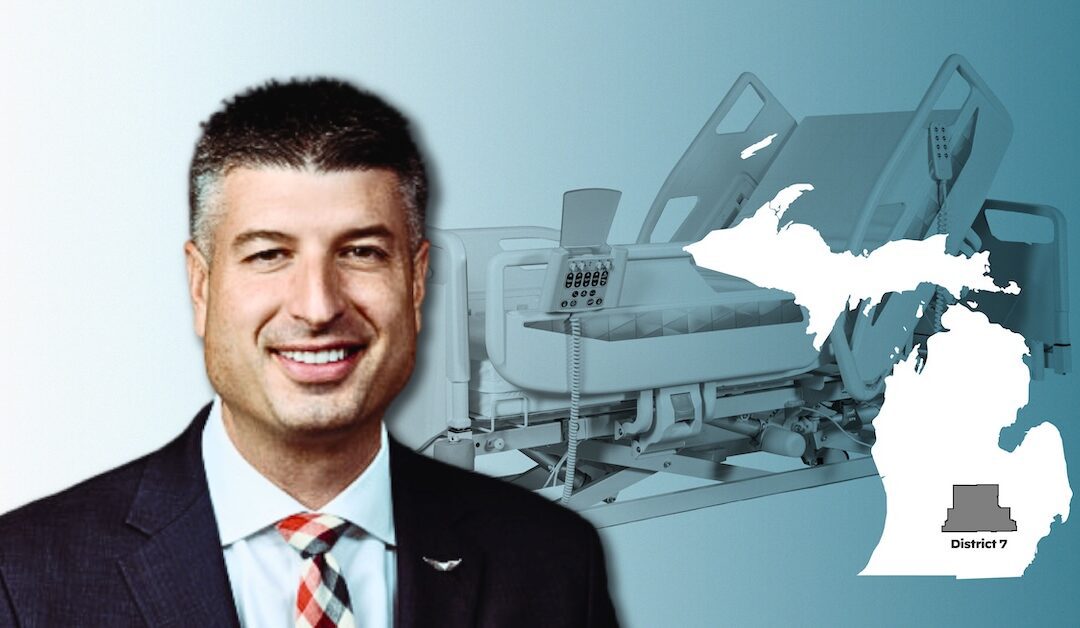
Leah Craig/Michigan Advance
BY LEAH CRAIG, MICHIGAN ADVANCE
MICHIGAN—The sweeping and draconian cuts to Medicaid by the Trump administration and congressional Republicans have left healthcare advocates around the country reeling.
At a virtual press conference hosted Tuesday by the Protect MI Care coalition, policy experts, advocates, and stakeholders contextualized what changes in the recently enacted “big, beautiful” bill will mean for Michiganders.
“By passing this bill, members of Congress have chosen to rip away healthcare from millions of Americans,” Monique Stanton, president and CEO of the Michigan League for Public Policy said. “Hundreds of thousands of Michigan residents, including kids, seniors in nursing homes, people with disabilities, all stand to lose coverage, lose access to services, or face longer wait times because of these tax cuts.”
CEO of Michigan Health and Hospital Association Brian Peters explained that the nonpartisan Congressional Budget Office predicts that federal funding for Medicaid and Children’s Health Insurance Program will undergo a $1.02 trillion reduction by 2034. The budget office later clarified that this reduction stems from a revised enrollment estimate, anticipating 79.5 million Medicaid beneficiaries by 2034 instead of the previously projected 90 million.
Peters went on to state that the effects of this legislation will be far-reaching as the reductions won’t just impact Medicaid beneficiaries; they’ll affect all patients.
Essentially, hospitals and healthcare providers rely on the federal funding disbursed through Medicaid to fund critical services and patient care. This is made possible by the Medicaid provider tax program, which allows states to maximize healthcare funding by levying taxes on providers instead of taxing citizens.
Elizabeth Hertel, director of the Michigan Department of Health and Human Services, explained that if 40% of a county’s residents are Medicaid beneficiaries, 40% of that hospital’s revenue comes from Medicaid.
“Our hospitals and our providers will face limiting services or closing locations, and healthcare workers will lose their jobs when a hospital or provider limits services or closes,” Hertel added. “They don’t stop seeing patients who have Medicaid. They stop seeing everybody who lives in or visits that community.”
For Michigan hospitals, Peters noted, that’s a loss of more than $6 billion in funding over the next decade.
The future of Medicaid has effectively been shifted to individual states, many of which may have to begin either limiting Medicaid benefits, lowering the rates they pay providers, or stiffening eligibility requirements so that fewer people will qualify for coverage.
Hospitals typically work with three to five-year strategic plans, which means that, while these changes aren’t set to take effect immediately, healthcare providers must make crucial staffing and budgeting decisions sooner rather than later.
State legislatures are likely to be in a similar position. To Peters, the potential for future disruption is a present call to action.
“I think there’s the opportunity in the here and now, working with our state officials, our state lawmakers, and certainly at the federal level as well, to create new legislation, new policies that can help the provider community and the healthcare community,” Peters said. He went on to add that he looks forward to working with partners in the state government to mitigate the impact of this new legislation.
READ MORE: Michigan lawmaker says nobody voted for Medicaid cuts
This coverage was republished from Michigan Advance pursuant to a Creative Commons license.

‘Big beautiful bill’ will end Medicaid for people in Bay and Saginaw counties this year. Here’s how many will lose it—and who’s responsible
The district includes Flint and the Tri-Cities, and faces some of the most severe challenges in the state as a result of Trump’s tax bill. The...

‘Big beautiful bill’ will end Medicaid for people in Ingham, Shiawassee, and Livingston counties this year. Here’s how many will lose it—and who’s responsible
The representative who voted to take away health care from nearly 14,000 Michiganders in his district has been dodging constituents’ questions and...

‘Big beautiful bill’ will end Medicaid for people in Kalamazoo, Holland, and Battle Creek this year. Here’s how many will lose it—and who’s responsible
The representative who voted to take away health care from nearly 15,000 Michiganders in his district is “looking forward” to announcing his...

‘Big, Beautiful Bill’ will cost Michiganders money in 2025—here’s how much, and who’s responsible
From higher utility bills to job cuts across multiple industries, Michiganders can expect their wallets to feel a little thinner this year—and in...

‘Big beautiful bill:’ Here’s how many people will see higher monthly bills in Lansing, South Lyon, and Howell this year—and the politician who let it happen
District 7 faces more than $565 million in financial losses tied to GOP-supported spending cuts. Michiganders living near Lansing will lose more...




